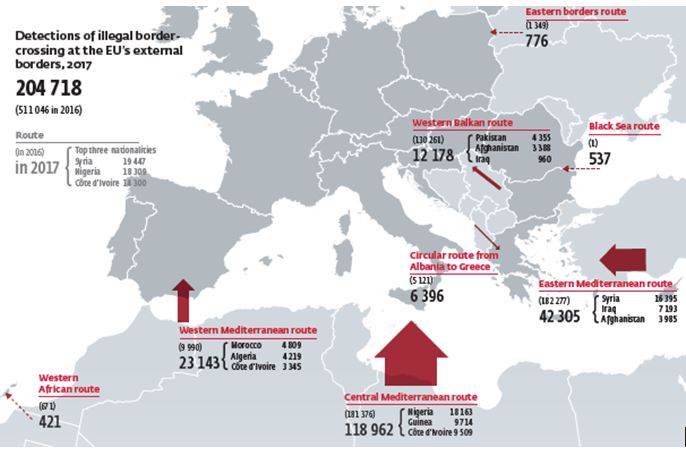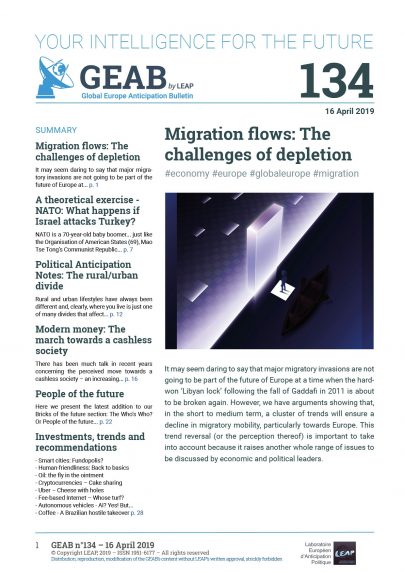GEAB 134

It may seem daring to say that major migratory invasions are not going to be part of the future of Europe at a time when the hard-won ‘Libyan lock’ following the fall of Gaddafi in 2011 is about to be broken again. However, we have arguments showing that, in the short to medium term, a cluster of trends will ensure a decline in migratory mobility, particularly towards Europe. This trend reversal (or the perception thereof) is important to take into account because it raises another whole range of issues to be discussed by economic and political leaders.
Libya 2019: Risk of new migration crisis or opportunity for the radical rights in the European Elections?
Let’s start by positing the most obvious short-term anticipation:
- On the one hand, the war currently breaking out between the two camps (Haftar in the east and al-Sarraj in Tripoli)[1] is all that is needed to provoke a new influx of migrants to Europe: migrants from Africa and the Middle East, currently interned in camps that are likely to be abandoned (between 700,000 and 1 million people[2]), and Libyan migrants fleeing a country at war (6 million inhabitants, including 1 million in Tripoli ).[3]
- On the other hand, the fulfilment of Netanyahu’s campaign promise to annex the West Bank[4] (which we saw coming in the last issue[5]) is another matter of concern for Europe.[6] Although we have seen that this annexation attempt is the culmination of a long diplomatic-strategic preparation, there are significant risks of slippage and this would inevitably lead to further population movements.
Therefore, it’s not impossible that, in the short term, the topic of the migrant crisis will appear in the news again… And the impact on the European election campaign would be dramatic, blocking any hope for a rich debate on the future of Europe, as parties and the media find themselves competing with one another in their outrage and proposals to close the borders. It is clear that renewed tensions in Libya and the Middle East may reinforce anti-migrant measures and rhetoric far more than the number of refugees already in Europe. Whatever, Mr. Haftar has chosen a very strange moment to launch his military adventure! [7]
Fortress Europe: from ‘doing’ to ‘telling’
Whether the Libyan war is calming down or not and whether the annexation of the occupied territories is going well or not, one thing is certain: the migrant crisis of 2015 has already led to the closure of the European continent.

Figure 1 – Illegal migrant flows towards Europe, 2017. Source: AEDH.
It should be remembered that national border controls were re-established in 2015-2016 and some of these have remained in place ever since – in particular, all French borders and some bi-national borders (Austria-Slovenia, Austria-Germany, Sweden-Denmark, Norway-Sweden-Denmark).[8]
As for the common borders, since 2016 they have been guarded by Frontex, an agency created then to help host countries to welcome refugees or deport them either home or to camps outside Europe.[9]
Internment camps (deemed inhuman by NGOs)[10] surround Europe’s perimeter.[11] Denmark confines its unwanted migrants to a small island (where they are sent aboard a ship named Virus! [12]); France uses the argument of the fight against terrorism to block refugees on its borders;[13] Italy has voted for decrees to facilitate expulsions and the stripping of Italian citizenship;[14] etc. In reality, the management of the migrant crisis by Europe, the whole of Europe, is probably already being added to the record of black periods in its history, once again endangering the credibility of Europeans as defenders of human rights.[15] Even if, at the moment, information is difficult to obtain on the countless human tragedies that continue to mark this piece of history, the future will yield sad revelations for us.
But if there is anything to judge, it is more the role the EU has played in the degradation of its close neighbourhood than its inevitable reaction to the vast flow of refugees resulting from this degradation. Political anticipation teaches us this: in a complex world, crises must be anticipated, because once they have arrived, no good solutions come to hand anymore. The panic that gripped the media, politicians and public opinion in 2015 automatically forced the implementation of those tough policies.
That said, the rather centrist government authorities who presided over these decisions preferred to do so discreetly for two main reasons: so as not to visibly ignore their liberal DNA and so as to avoid authorising/making official a public speech of intolerance. The problem is that, as a result of this discretion, a significant proportion of European public opinion continues to resent government bodies, who they still see as the promoters of uncontrolled migration flows. Hence it is likely that European election will provide the context for a transition from ‘doing’ to ‘telling’ in terms of immigration where, in order to retain control, centrist parties[16] will join the voices of the far-right[17] to ‘demand’ border control actions which are, in fact, already in place,[18] resulting in a gigantic trivialisation of intolerance … (and, of course, in the consolidation of the minority camp of tolerance).
Fortress Europe is, therefore, a reality that is gaining in visibility, especially seen from the outside, and this has already begun to divert immigration routes from the old continent.[19]
Climate crisis: Where will the rural exodus go?
The other commonly held certainty is that climate change will soon be a new major cause of population movement.[20] And without anything needing to be said, most Europeans understand that these movements will inevitably move towards Europe. The World Bank estimates that 140 million people will be displaced in Africa, Asia and Latin America by 2050. And, currently, an estimated 25 million people are displaced each year due to climate change. [21]
Hence it is already clear that these movements are not advancing towards Europe to any great degree, if at all. Rather, they are internal and don’t progress far beyond their point of origin.[22] In fact, these climatic migrations are intimately linked to a vast process of rural exodus, which is now occurring everywhere. Let us remind that 65% of the 1.2 billion Africans and as many Indians still live in rural areas while powerful shifts towards modernisation and urbanisation are already taking place across those regions.[23]
Login

NATO is a 70-year-old baby boomer... just like the Organisation of American States (69), Mao Tse Tong's Communist Republic of China, the Federal Republic of Germany, the Democratic Republic of [...]
Rural and urban lifestyles have always been different and, clearly, where you live is just one of many divides that affect our societies. But this divide is one that has [...]
There has been much talk in recent years concerning the perceived move towards a cashless society – an increasing tendency to remove physical cash from general circulation and replace it [...]
Here we present the latest addition to our Bricks of the future section: The Who’s Who? Or People of the future. Just as organisations have a vocation to stabilise at [...]
- Smart cities: Fundopolis? - Human-friendliness: Back to basics - Oil: the fly in the ointment - Cryptocurrencies – Cake sharing - Uber – Cheese with holes - Fee-based Internet – [...]

Comments